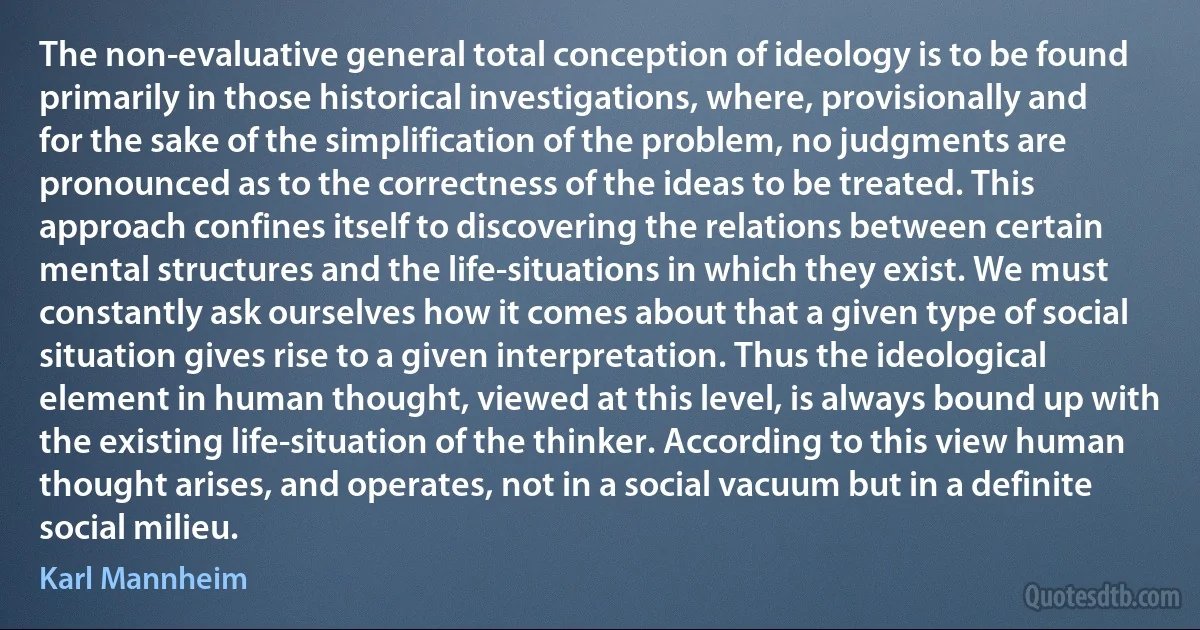
The non-evaluative general total conception of ideology is to be found primarily in those historical investigations, where, provisionally and for the sake of the simplification of the problem, no judgments are pronounced as to the correctness of the ideas to be treated. This approach confines itself to discovering the relations between certain mental structures and the life-situations in which they exist. We must constantly ask ourselves how it comes about that a given type of social situation gives rise to a given interpretation. Thus the ideological element in human thought, viewed at this level, is always bound up with the existing life-situation of the thinker. According to this view human thought arises, and operates, not in a social vacuum but in a definite social milieu.
Karl MannheimRelated topics
approach ask bound certain comes conception definite discovering element found general given gives historical human ideology interpretation problem rise sake simplification situation thought thinker thus view relations confines milieuRelated quotes
Climbing the bole of the tree, a man clings with all his arms and legs, and lays hold of every knob and sliver. When he mounts amongst the branches, it should be with a more easy alacrity. A man will often be apt at the one operation, yet awkward at the other. Nor is it, indeed, common to meet with a man of such a character as can be carried from a low condition of life through successive ascents, with an aptitude for every condition into which he passes; and thus it is that men who rise well will often stand infirmly. But for want of due consideration being given to the nature of men and circumstances, it is a usual thing to hear, not only regret but surprise expressed, when a man who has attained an elevated position in life exhibits in that position those very defects of character through which he is there.

Henry Taylor
An autonomous electorate, free because it is free from indoctrination and manipulation, would indeed be on a "level of articulate opinion and ideology” which is not likely to be found. Therefore, the concept has to be rejected as "unrealistic”-has to be if one accepts the factually prevailing level of opinion and ideology as prescribing the valid criteria for sociological analysis. And-if indoctrination and manipulation have reached the stage where the prevailing level of opinion has become a level of falsehood, where the actual state of affairs is no longer recognized as that which it is, then an analysis which is methodologically committed to reject transitive concepts commits itself to a false consciousness. Its very empiricism is ideological.

Herbert Marcuse
But he, with these burthens on him, planned, commenced, and completed, the History of India; and this in the course of about ten years, a shorter time than has been occupied (even by writers who had no other employment) in the production of almost any other historical work of equal bulk, and of anything approaching to the same amount of reading and research. And to this is to be added, that during the whole period, a considerable part of almost every day was employed in the instruction of his children: in the case of one of whom, myself, he exerted an amount of labour, care, and perseverance rarely, if ever, employed for a similar purpose, in endeavouring to give, according to his own conception, the highest order of intellectual education.

John Stuart Mill
I now saw, that a science is either deductive or experimental, according as, in the province it deals with, the effects of causes when conjoined, are or are not the sums of the effects which the same causes produce when separate. It followed that politics must be a deductive science. It thus appeared, that both Macaulay and my father were wrong; the one in assimilating the method of philosophising in politics to the purely experimental method of chemistry; while the other, though right in adopting a deductive method, had made a wrong selection of one, having taken as the type of deduction, not the appropriate process, that of the deductive branches of natural philosophy, but the inappropriate one of pure geometry, which, not being a science of causation at all, does not require or admit of any summing-up of effects.

John Stuart Mill
Traditionally, economic analysis treats the economic system as one of the givens. The term "design" in the title is meant to stress that the structure of the economic system is to be regarded as an unknown. An unknown in what problem? Typically that of finding a system that would be, in a sense to be specified, superior to the existing one. The idea of searching for a better system is at least as ancient as Plato's Republic, but it is only recently that tools have become available for a systematic, analytical approach to such search procedures. This new approach refuses to accept the institutional status quo of a particular time and place as the only legitimate object of interest and yet recognizes constraints that disqualify naive Utopias.

Leonid Hurwicz
